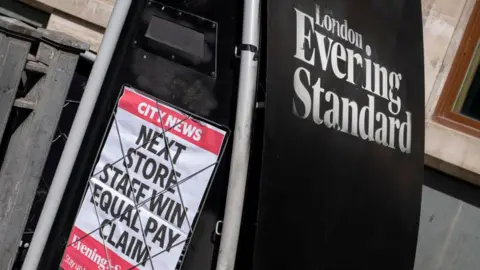Final print of the Evening Standard as it becomes weekly
 Getty Images
Getty ImagesThe London Evening Standard has printed its final paper ahead of a move to weekly-only editions and a rebrand.
From next Thursday, the paper will become a weekly edition under a new title called The London Standard.
The Monday and Friday editions had been phased out in early August, according to the Press Gazette.
The newspaper launched in its original incarnation in 1827 and became free of charge in 2009, seeing particular popularity with the capital's commuters.
The paper's parent company has also struck a deal with City AM, a free daily, which focuses on business and finance, to take up the Standard's distribution slots.
Albert Read, executive chairman of the London Evening Standard said: "As the Standard embarks on the next phase of its journey, its new weekly print publication will set the bar high, reaching new readers, and reflecting the dynamism and excitement of London."
He said the distribution deal with City AM, which is published by a separate company to the Standard, would bring "two formidable titles together".
 Getty Images
Getty ImagesThe Standard's move to a weekly edition was announced in May amid declining circulation.
The Press Gazette, which covers the media industry, reported in July that about 70 redundancies were expected to be made at the Standard.
Circulation decline
The paper's daily circulation has dropped from 850,000 to 275,000 in the past five years, and it has lost £84.5m over the past six years.
The paper's forerunner, named the Standard, launched 197 years ago, with an evening version added in 1859.
In 2009, businessman and former Russian intelligence officer Alexander Lebedev, along with his son Evgeny, purchased the London Evening Standard.
After they took control, circulation saw an increase as they transitioned the paper to a free model, relying on advertising revenue instead of sales.
Despite continuing as a free publication, circulation has since fallen back to just above the levels seen when they took over.
An email to staff in May announcing the decision cited increased working from home and Wifi on the Tube as negative impacts on its circulation.
"Although this process may be unsettling, our goal is to replicate our previous success with our sister title, The Independent, which has seen enduring growth in readership and commercial success following its own strategic transition in 2016," it said.
The Independent moved to a digital-only operation in 2016.
Twelve million people access the Standard's digital platforms every month, with half of that traffic coming from outside London and overseas, the email said.
Listen to the best of BBC Radio London on Sounds and follow BBC London on Facebook, X and Instagram. Send your story ideas to [email protected]
